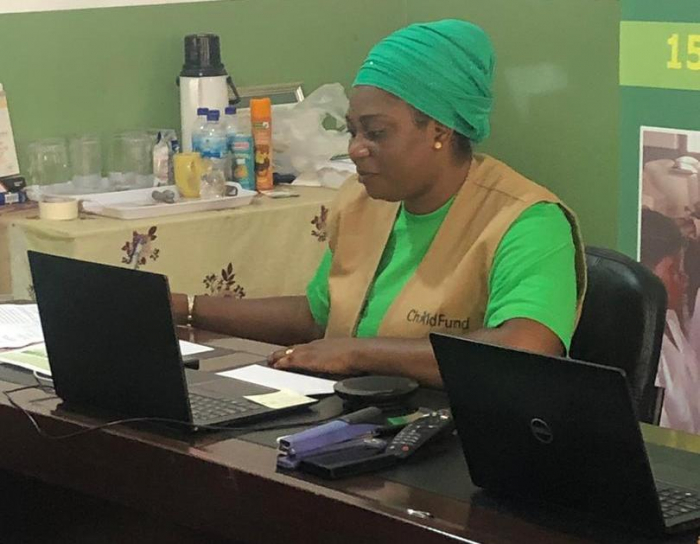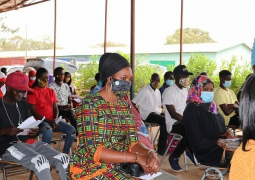
Mrs. Komma-Bah made these remarks last Friday during a virtual international dialogue in commemoration of international day of the girl child with selected enrolled ChildFund Children with the selected topic: “The Impact of Covid-19 on Girls.”
The International Day of the Girl Child focuses attention on the need to address challenges girls face and to promote girls’ empowerment and the fulfillment of their human rights.
She pointed out that today, adolescent girls have the right to a safe, educated and healthy life not only during these critical formative years but also as they mature into womanhood.
Mariama Jallow, a 17-year old student of Nusrat Senior Secondary School in presenting the topic: ‘Education-focusing on School Dropouts and Quality Education’ said the importance of educating a girl child cannot be over emphasised.
Mariama a member of Sama Kairo Federation added that educated girls are more likely to become in the workforce and in turn bring economic stability to their families and communities, however, she said girls face a lot of challenges in their educational process.
Some of these challenges she said include teenage pregnancy, lack of sanitary items, early marriage among others.
She observed that sadly most of our parents used the covid-19 pandemic to their advantage and get their girl children married off which leads to school dropout.
She therefore recommended to ChildFund, UNICEF, Gambia government, NGOs, MoBSE, CPA and Ministry of Health to take the issue as a high priority and bring an end to school dropout by implementing the laws on early marriage.
She also appealed for the provision of sanitary material for schools for girls as well as organise workshop in communities to sensitise girls and their parents about career realities to pave the way for quality education. She also called on girls around the world to recognise their rights and also speak out loud.
Fatou Camara, 21-year old girls currently attending Gambia College presented on Sexual and Gender Based Violence During Covid-19. According to her, a survey conducted in the country reveals that 75 percent of girls between the ages of 15 to 19 have undergone FGM/C.
She highlighted that the effects of SGVB on women vary widely depending on the nature of the particular incident, noting that sexual and gender based violence are very common in The Gambia.
The Ding Ding Yiriwa Federation member stated that the number of child abuse and rape cases increased during the pandemic and no one seems to care.
Victims and survivors of SGVB she went on suffer endlessly physiologically, health, stigma, economically.
Neneh Bojang, a 16 year-old student of Nusrat in her presentation on Menstrual Hygiene, said it is important to talk to girls at an early age to ensure they are prepared before the period.
She told her fellow girls that when they see their menstruation it means they are mature and when they have sex with a boy or man they will get pregnant.
She urged her fellow girls and women to keep separate under wears for their period in order to be comfortable, change regularly, wash their pats clean and keep in a safe place, as hygiene is key in menstruation.
She highlighted that challenges adolescent girls face during menstruation include use of non-absorbent and uncomfortable menstrual cloths, inadequate sanitary materials, and therefore appealed to government to help them especially those of them in rural areas.
The Foni Ding Ding Federation member added that lack of counseling about menstrual cycle and lack of disbursable places are also challenges for them.
Rohey Bittaye-Darboe, Permanent Secretary Ministry of Women, Children and Social Welfare said her office launched a 1313 hotline during the pandemic for people to report cases of SGBV but was quick to add that Gambians do not have the culture of reporting which is a challenge.
She expressed her ministry’s readiness to ensure children are protected and empowered.
Lamin Fatty, Coordinator, Child Protection Alliance said there are laws that could have prevented abuse on girls and women from happening in the country but noted that these laws are usually not enforced. He highlighted that having laws alone is not enough.
According to him, the covid-19 has created so much negative impact but has also created some positive opportunities that we can work on to address issues of children particularly the girl child.
“Criminal offences like rape should not be negotiated,” he remarked, saying there has been a lot of discrimination against the girl child in The Gambia.
He noted that government must invest heavily around child in The Gambia, observing that the number of girls begging and selling on the streets is alarming.
Essa Sowe, Deputy General Secretary, The Gambia Teachers Union said schools have been providing safe spaces for girls, noting that girls were more vulnerable in the wake of covid-19 and were subjected to higher risk, abuse and exploitation.
Mr Sowe said the ministry needs to step up because one thing that lack in our school system particular with the basic and secondary education is guidance and counseling.
Deputy GS Sowe said the recently concluded GABECE exams showed that over 900 students were absent or had their grades cancelled which 55 percent were girls, noting that this shows the need for us to work on modalities to address issues concerning girls in the country.
“Learning lose during the covid-19 pandemic cannot be recovered until 2030,” he stated, saying covid-19 limited the participation of girls in the recently concluded distance learning due to domestic engagements.
Read Other Articles In Youth Forum



